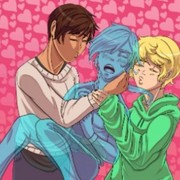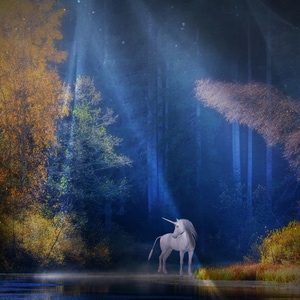John took a shaking breath. “The song. What does it mean?”
“It is an old lore-song, and very beautiful. I do not know its meaning.”
“The last line speaks of a Rose. I am in quest of a Rose.”
“Alas! If there is any meaning to it, it was forgotten long ago.” Sticks cracked in the undergrowth, but it was not until she was close enough to touch that John discerned a pale face in the dark and knew for a certainty that he was speaking to Columbell.
Hers was the only friendly face he had seen in—how long? since Simple Alf met him on the forest eaves? and she came to him out of the dark like the first gleam of hope. “Have you come to help me, lady?”
“Aye. If help I may.” She threw a glance over her shoulder, so that the pale oval of her face vanished. For a moment he thought she had melted into the shadows, but then she turned back to him. “Ah, Sir John, I feared for you… Had you tasted the Queen’s cup, you might never have seen your home again, nor your lady.”
John felt the hair prickle upright on his scalp. “Never? Aye, indeed?”
Her face vanished again in another backward glance, as if in fear of some listening ear. “Aye. The beginning of it was that once, longer ago than any of us can count, the Queen herself was stolen by the Lady of the Dark Tower.”
John remembered Sir Calidore’s evasions when Thomas Lene asked if anyone had ever been rescued from the Tower, and gave a soft breath of understanding. “She was ransomed?”
“What else could we do?” Columbell whispered. “And that was the beginning of the tiend. Once in every seven years, one of us is paid—in tribute—” her voice faltered—“in tribute to Hell. At such a price was the Queen’s ransom fixed.”
“And you were willing to pay it? Lady, your people are surpassing loyal.”
Columbell bowed her head; the faintly luminous oval of her face waned and almost faded into shadow. “Nay, do not call us that. That was the first of our forswearings.”
John waited. Columbell went on, murmuring under the sigh of the wind.
“Those who eat the faerie food, or drink the faerie cup, are bound to serve the Faerie Queen. She did take a sudden liking for you, Sir John-a-Dale. But every seven years, the tiend… Fay lives are precious in our eyes, and we do not tiend ourselves willingly. If it may be done, we entice a mortal to our hall, entrap him to our service…and if he be fair and full of flesh, he is tithed.”
All at once, John understood. “Sir Thomas Lene.” He swallowed bile. “When I found him, he lay in hiding on the borders of Faerie. When I asked him, he feared to guide me. But then he changed so suddenly…He would have made a gift of me to the Queen. My life for his.”
“It is often done.” There was a velvet-whisper of motion in the dark like a shrug. “There is no need to seek your revenge. He was tithed.”
The last three words sliced through John’s outrage like a knife.
“Tithed?”
“He brought Gloriana’s wrath upon him, John-a-Dale, in fetching you to court. When the seventh Hallow’s Eve by mortal reckoning came, soon after your leaving, the Queen chose him for the tiend. Did you not hear them ride away?”
Those hoofbeats—those horn-blasts.
And with them, a man had been condemned to Hell, in the blink of an eye, in such a manner as left no hope of grace or penitence or any of the kind terms that held purchase in the mortal world.
John shuddered.
“Why, madam, she might have picked you.”
She laughed, a sound frightening in its melancholy. “I was half-certain she had.”
“Is there no escape? If a mortal can escape the curse of death by coming to Faerie—”
Columbell shook her head. “There is no true escape for either of us.”
“What of the Rose, the breaker of spells?”
“I believed in it once. But now…”
Her voice faded into uncertainty. For the first time since he had dreamed of the Unicorn, John himself felt the whisper of doubt. Not in England—not in Faerie! When had he become foolish enough to put his trust in dreams? Surely Janet was lost forever. God would not give such grace to an oaf like himself.
But at once the thought refuted itself. It was bad divinity—it was heresy. The Rose must exist. And there must be hope, even for Faerie.
“I will find the Rose,” he promised her. “And I will free you.”
It was too dark to see more than the outline of her face, but he thought she smiled. “That is too much to hope for.”
“Can you show me a path home, lady?”
“There is no path at present. Only the Queen’s malice.” She sank down and settled herself on the ground. “Stand further off, Sir John. I was calling for help when I heard your voice. It is a slender hope, but I will try again.”
John stepped back one pace, two, and the oval of her face faded into shadow. From the dark, she began to sing again:
Lully, lullay, lully, lullay!
The falcon hath borne my mate away.
She sang the song once, and then twice, and nothing happened save that the wind died to a dead calm. A third time she sang the song, and then it was that John began to see a white light moving through the trees.
It shone fiercely, almost blue, like a star that has fallen to earth, and as it drew nearer the darkness retreated and the gnarled limbs of the forest solidified out of the shadows. Nearby Columbell was seated beneath an elm-tree in a pool of skirts. When the light grew, the moth-wing grey of her gown changed to a colour too delicate and fragile to name, a colour somewhere between silver and lavender-blue, as different from its former appearance as a strand of gossamer in the grass on a summer’s morning differed from the dusty cobwebs in the corner of an abandoned house.
John put up his hand to shield his eyes. The star broke through the trees and when his vision adjusted to the radiance, he recognised it at once, white as milk, horse-tall and horned. The Unicorn.
It trotted directly to Columbell, knelt before her, and nuzzled her cheek. She put up a trembling hand to stroke its mane; her voice, when she spoke, whispered hesitantly.
“Old friend, is it you indeed?”
Faith, lady, I thought you had outgrown me.
The voice shocked into John’s mind in a silver blast like a trumpet. But the silence of the wood remained unbroken.
“I said so, did I not?” A smile trembled on the fay-woman’s lips. “But you see that I have repented of that inconstancy.”
The Unicorn kissed her cheek again. All blood under the Moon suffers that malady. Who is the Man in the thicket?
John had seen this beast—or another of its kind—in battle. Slowly, cautiously, he put up empty unthreatening hands and moved forward. “One who needs your help. Take pity on a lost mortal, gentle beast, and show me the way back to England.”
The Unicorn rose to its full height and pointed its horn at him, its voice beating like waves against John’s mind. A knight of the Rose? Here?
“He came for his true-love’s sake,” Columbell said.
“The Rose!” John stepped forward eagerly, almost upon the creature’s horn. “You know of it?”
I know of it.
“I came to Faerie in search of it.” He took a quick shallow breath. “Tell me, of your mercy, where I may find it.”
It is not in Faerie.
“No. But I had to make sure.”
He thought the Unicorn laughed, not unkindly. Before it could answer, the sound of a hunting-horn floated down the wind, and then, a moment later, the full cry of hounds.
The Unicorn gave a beckoning jerk of its head. The Queen rides a-hunting! Follow me.
Columbell rose to her feet. John took her hand and kissed it.
“When I have the Rose,” he repeated, “I will free you, if I can.”
She laid her other hand over his. “I will watch the day, friend.”
There was no time for more. The Unicorn pawed the ground. John swung away from the fay-woman and leaped after it.
It led him through the forest at a fast clip, and though clouds still choked the moon there was no need of the inconstant orb, for John ran in a meteoric trail of light. Before long they joined a path bordered in white stones which led them steeply uphill against a looming cliff on the right. At last the path lifted out of the dell. With the horns and hounds hot on his trail John had no time to glance back, but he triumphed to think of the lights of Cleopolis falling behind them.
Ahead, the road came to a fork. On the left, it ran winding into sweet ferny brakes; on the right, it rose up a steep incline and plunged into a thicket.
Heed not the bonny path! The Unicorn’s voice shook like a fanfare as it leapt goat-foot sure up the the rocky way to the right. John followed it, almost tearing skin and shirt on the thorns. Fear not the hound’s yell! They cannot touch you on the right path.
John was built for smithing not sprinting, and his heart already hammered painfully in his chest, but he drove the sweat out of his eyes with the back of his hand and pushed on. To the left, thorns guarded the path. To the right, the mountain rose sheer above. The hunt was silent now. John threw a glance behind. Lean grey shapes coursed on his heels; he could see the gleam of their eyes. Somewhere within he found a new reserve of strength, and put on another turn of speed, but they gained on him.
Keep to the path! the Unicorn called again. They had come to another fork, this time intersecting with a broad well-paved road sloping down onto a fair plain. Here the thorns gave way, like a gap in the wall on their left hand. At that moment a hound whisked past them and leaped up ahead of them, almost under the Unicorn’s hooves. It showed its teeth and snarled. John shouted a warning, but the Unicorn cried, They cannot touch you on the right path! and bowed its head and pierced the dog through the body. With a twist of its neck the hound spun off the hillside into the night, and rolled crackling through the thorns below.
The Unicorn plunged on, but John skidded to a stop with a cry.











Comments (0)
See all